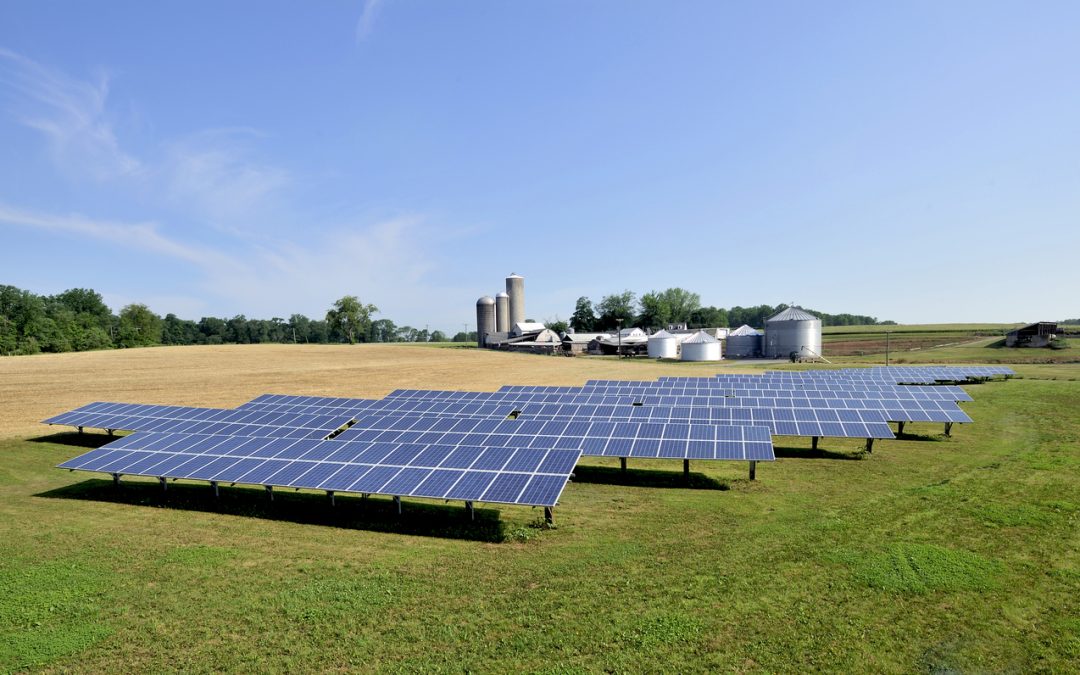Farming and agriculture are integral to our country’s infrastructure, and solar energy is integral to sustaining that infrastructure in the coming years. With our increasing global population, more and more people need to be fed. This is increasing a demand for high-yield crops and well-bred livestock at a time when climate change is challenging farmers’ livelihoods. Farmers who hope to slow the effects of fossil fuel usage and harmful emissions are looking to solar energy to power their farms and save them money. Here’s why you should do the same if you are a Minnesota farmer or own agricultural land.
You can use solar energy to power your Minnesota farm
Solar energy can be used to power nearly everything you use on your farmland:
- Irrigation systems
- Water wells
- Livestock barns and electric fences
- Hybrid or electric vehicles and GPS
- Crop and milk processing equipment
- Lighting and energy for your home and/or any other buildings on the property
Essentially, anything you normally power with grid electricity can be converted to run off solar energy to save you money and make your farm more self-sufficient.
Delicate crops may grow better under solar panels
Farmers who grow sensitive crops prone to drought such as tomatoes and herbs will benefit from the partial shade their new solar panels provide. Growing crops under solar panels can help avoid dry, drought-like conditions in the heat of the summer. These delicate crops thrive under solar panel arrays.
Freestanding solar panel modules also regulate the soil temperature underneath them by absorbing the sunlight before it reaches the ground; this is great for extending spring and fall crops like lettuce, kale, spinach, and asparagus.
Solar modules have no impact on small Minnesota farm animals
Free range poultry and sheep are free to continue grazing on the land where your solar panels are installed. In fact, sheep are commonly being used as vegetation control at a number of solar facilities. They do not pose a threat to the modules, and the standard height of the modules leaves plenty of room for the sheep to graze without raising the solar panels.
Larger livestock such as cattle is not recommended to be allowed to graze near the array due to the potential of damage to the modules. Luckily, a security fence can easily be installed to keep out larger livestock and wildlife.
You’ll save money on power and increase crop yields with solar energy
Due to numerous state and federal solar programs and grants, you will likely have little to no upfront cost when installing solar panels on your agricultural land. Without high start-up costs to consider, your panels will begin saving you money on power right away. A payment towards your solar equipment will, in many cases, be substantially lower than what you were paying monthly for grid power. And many solar panel users find their solar array produces enough energy to completely power their farm – bringing their monthly electricity charges to zero.
Studies have shown that installing solar modules above crops can actually lead to a higher yield in some cases. As I mentioned before, temperamental crops usually benefit from the regulated temperatures and sunlight that result from having solar modules installed above them. What’s more, even naturally hardy crops have been shown to produce an average or higher yield when grown on the same land as solar modules. It seems most all crops do benefit from the regulation of heat: the soil stays cooler during the day but warmer at night.
Another way many farmers make money from solar is by leasing their unused agricultural land to solar energy companies who install their own panels to supply power to the grid for their customers. If you’re not ready to install your own solar modules, this may be an alternative to consider in the meantime.
Work with a local solar company to install solar panels on your Minnesota farm
If you’d like more information about switching your farm to solar energy, contact Cedar Creek Energy: an experienced local company with integrity. Cedar Creek Energy’s team of project managers, engineers, and solar equipment installers will help you determine if solar energy is a good option for powering your farm and will keep you informed through every step of the installation process. You can reach Cedar Creek Energy at (763) 432-5261.

